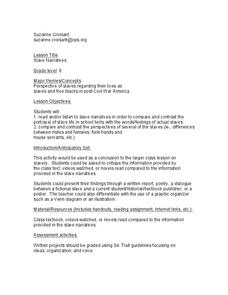PBS
African American History: Climbing the Wall
Imagine the challenge of trying to trace your family genealogy if no records were kept of births and deaths. Where would you look for information? What types of documents could provide you with the information you seek? History...
West Virginia Department of Education
A State of Convenience: The Creation of West Virginia
Ever wondered why there is a West Virginia but not an East Virginia? The resource answers questions like this one and more as it takes an in-depth and detailed look at the history of West Virginia and how it became a state. Several...
Alabama Department of Archives and History
Clotilde, The Last Slave Ship
The Clotilde was the last known ship to bring slaves from Africa to the United States - good riddance! Dive into the details of the ship, its cargo, origin, and route, and learn about the future of the Africans on board with a...
Curated OER
Uncle Tom's Cabin and American Culture
Young scholars examine and analyze primary sources. They analyze the causes and effects of major events of the Civil War. They explain a variety of antebellum notions of slavery. They understand the impact that Uncle Tom's Cabin had on...
US House of Representatives
“The Fifteenth Amendment in Flesh and Blood,” The Symbolic Generation of Black Americans in Congress, 1870–1887
The reading of a contextual essay launches a study of Black Americans who served in Congress from 1870 through 1887. Young historians identify the African Americans who served during this period, investigate the ways they won national...
American Battlefield Trust
Emancipation 1861 to 1863
Academics read newspaper articles from 1861 to 1863 regarding Emancipation and answer questions to understand how public opinion changed over time and why. The activity provides scholars with good historical context and the vocabulary...
Facing History and Ourselves
Violence and Backlash
Revolution and counterrevolution. Protest and counter-protest. Collaborators and bystanders. The focus of the fifth resource in the Reconstruction Era and Fragility of Democracy series is on the political violence that followed Radical...
Facing History and Ourselves
A Contested History
Memories of and interpretations of history change—that's the key takeaway from a lesson that has young historians compare the story of the Reconstruction Era as told by the historians of the Dunning School to the view of scholars today...
PBS
History of Juneteenth and Why It’s Now a National Holiday
June 19 is now a United States federal holiday. Young historians examine the background of the first Juneteenth celebrations and why on June 15, 2021, Congress finally approved "Juneteenth National Independence Day" as a federal holiday.
Curated OER
American Colonization Society Lesson Plan
Students read an article online "Colonization and Emigration" and break into debating groups. They research points that support their side, namely whether or not the American Colonization Society was for or against segregation. They...
Curated OER
Slave Narratives
Students examine the slave perspective and how it differs from stories we hear in text books. In this slave narrative lesson, students use primary source narratives to compare how slave life was expressed by the slaves to how slave life...
Curated OER
Follow the Drinking Gourd
Students, after assessing a valuable history lesson, create an amazing and very personalized quilt. They explore how individuals helping the slaves escape to freedom, hung a quilt on their front porch to let the slaves know that the...
Curated OER
The African Grove Theater
Students study the African Grove Theater in New York. In this African American history lesson, students examine the evolution of race relations in the United States as they research the theater and its history.
West Virginia Department of Education
Declarations and the Quest for Life, Liberty and the Pursuit of Happiness
Understanding how John Brown got his inspiration from the Declaration of Independence helps learners further understand both West Virginia and United States history. The resource, a standalone, uses worksheets, discussion, and essay...
Federal Judicial Center
Amistad and Dred Scott—a Comparative Activity
What do slaves fighting for their freedom on board a ship and a slave fighting for his freedom in a courtroom have in common? Budding historians investigate the two different cases of the Amistad slave revolt and the Dred Scott argument....
Library of Virginia
Life as a Liberated People
Imagine having no control over your life and then suddenly having to provide for yourself. Such was the challenge faced by many American slaves after emancipation. Class members are asked to consider these challenges are they examine...
Curated OER
The Life of Frederick Douglass
Students discuss the importance of effective leadership in a democratic society. They study the significance of the contributions of Frederick Douglass to America. They compare the effects of political, economic, and social factors on...
Curated OER
Sectionalism and the Kansas-Nebraska Act
Students define and discuss sectionalism and popular sovereignty, analyze impact of popular sovereignty in creation of state of Kansas, compare issues in territorial Kansas to current politically divisive topic, and evaluate primary...
Middle Tennessee State University
John Brown: Hero or Villain?
"Love it or leave it." "You're either for us or against us." Rhetoric and it's polarizing effects are the focus of a lesson that uses John Brown's attack on Harper's Ferry as an exemplar. Groups examine primary source documents,...
West Virginia Department of Education
Intelligence of Authentic Character - News Coverage and John Brown's Raid
The resource, a standalone, shows how news coverage of John Brown's Raid began when the event happened and how that reporting shaped perception in West Virginia history. The resource includes interesting anticipatory discussion...
West Virginia Department of Education
The Debate - John Brown: Martyr or Madman?
Did he die for a cause, or was he crazy? Although the resource discusses John Brown and West Virginia history, many historical figures have the same reputation. Teach learners about different perspectives and highlight the importance of...
Curated OER
Writing Exercises: Science and Technology II
All revolutions in science and technology have both pros and cons. Kids examine the advent of the green revolution, nuclear growth, use, and the countries that are considered nuclear powers. They'll construct three responses to each of...
West Virginia Department of Education
Editorials: The Guiding Voice of Authority?
How much can opinion influence a news story? A standalone resource discusses the importance of John Brown's Raid through the lens of journalism. Learners analyze two different texts, one from the perspective of the North and the other of...
West Virginia Department of Education
Harpers Ferry Letters
Scholars write letters as if they were someone who heard the story of John Brown's raid. The resource, a standalone, covers information from primary sources that is important to West Virginian history: the Harpers Ferry Letters.
Other popular searches
- Civil War Slavery Dance
- Post Civil War Slavery
- Civil War Slavery Geogrpahy
- Slavery and the Civil War
- Impact of Slavery on Civil War
- Slavery and Civil War

























